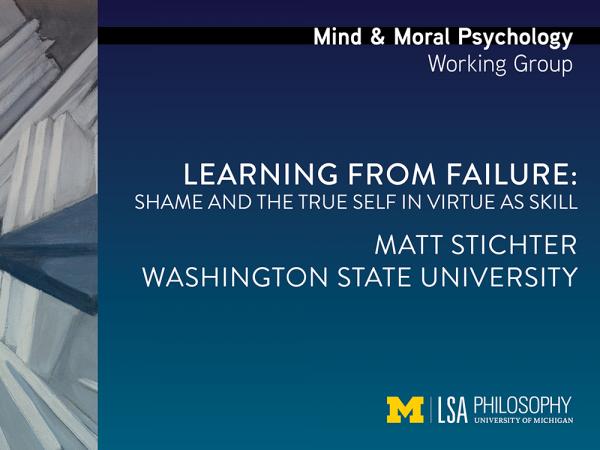Mind & Moral Psychology: Matt Stichter
Learning from Failure: Shame and the True Self in Virtue as Skill

Friday, March 19, 2021
3:00-5:00 PM
Virtual
A password is required to attend this virtual event. Please contact lksoter@umich.edu to request the password.
ABSTRACT
On an account of virtue as skill, virtue acquisition involves similar processes as skill acquisition. In this talk I focus on one implication of that account that deserves greater attention, which is that becoming more skillful requires learning from one’s failures, but that is especially challenging when dealing with moral failures. Moral failures will be a part of everyone’s life, and we all have to learn from these painful experiences. However, this is very difficult in practice, given that failure of any kind can be distressing, and especially so for moral failure. The distress created by a recognition of moral failure can prompt responses of anger, defensiveness, or disengagement; rather than attempts to make amends and when necessary to work on self-improvement. The most potentially distressing response to moral failure is shame, given that it is frequently associated with the feeling that one is a bad person, and that there is nothing that one can do about it. I suggest that the skill of emotion differentiation is a promising strategy for distinguishing the emotions we may experience in the wake of failure, including shame, in order to reduce the distress and encourage emotions that can motivate self-improvement.
In addition, I draw connections between that line of research and psychological work on the belief in a ‘true self’, which refers to the tendency for people to believe that they have a ‘true self’ that is essentially morally good. While this might seem to be good news for virtue theorists, since it may help to promote virtue development, I raise concerns that there may be some significant drawbacks, especially when it comes to motivating virtue development and moral improvement. This stems in part from people’s belief in their own moral goodness as being inherent (i.e. core to one’s essential self), rather than acquired (as with virtue development). Moral failure can challenge this belief that one is a morally good person, causing distress and leading to attempts to reinforce one’s identity as morally good (such as with moral ‘cleansing’), but at the expense of trying to learn from the failure and enact change.
ABSTRACT
On an account of virtue as skill, virtue acquisition involves similar processes as skill acquisition. In this talk I focus on one implication of that account that deserves greater attention, which is that becoming more skillful requires learning from one’s failures, but that is especially challenging when dealing with moral failures. Moral failures will be a part of everyone’s life, and we all have to learn from these painful experiences. However, this is very difficult in practice, given that failure of any kind can be distressing, and especially so for moral failure. The distress created by a recognition of moral failure can prompt responses of anger, defensiveness, or disengagement; rather than attempts to make amends and when necessary to work on self-improvement. The most potentially distressing response to moral failure is shame, given that it is frequently associated with the feeling that one is a bad person, and that there is nothing that one can do about it. I suggest that the skill of emotion differentiation is a promising strategy for distinguishing the emotions we may experience in the wake of failure, including shame, in order to reduce the distress and encourage emotions that can motivate self-improvement.
In addition, I draw connections between that line of research and psychological work on the belief in a ‘true self’, which refers to the tendency for people to believe that they have a ‘true self’ that is essentially morally good. While this might seem to be good news for virtue theorists, since it may help to promote virtue development, I raise concerns that there may be some significant drawbacks, especially when it comes to motivating virtue development and moral improvement. This stems in part from people’s belief in their own moral goodness as being inherent (i.e. core to one’s essential self), rather than acquired (as with virtue development). Moral failure can challenge this belief that one is a morally good person, causing distress and leading to attempts to reinforce one’s identity as morally good (such as with moral ‘cleansing’), but at the expense of trying to learn from the failure and enact change.
| Building: | Off Campus Location |
|---|---|
| Location: | Virtual |
| Event Link: | |
| Event Type: | Livestream / Virtual |
| Tags: | Philosophy, Psychology |
| Source: | Happening @ Michigan from Department of Philosophy, Weinberg Institute for Cognitive Science |

